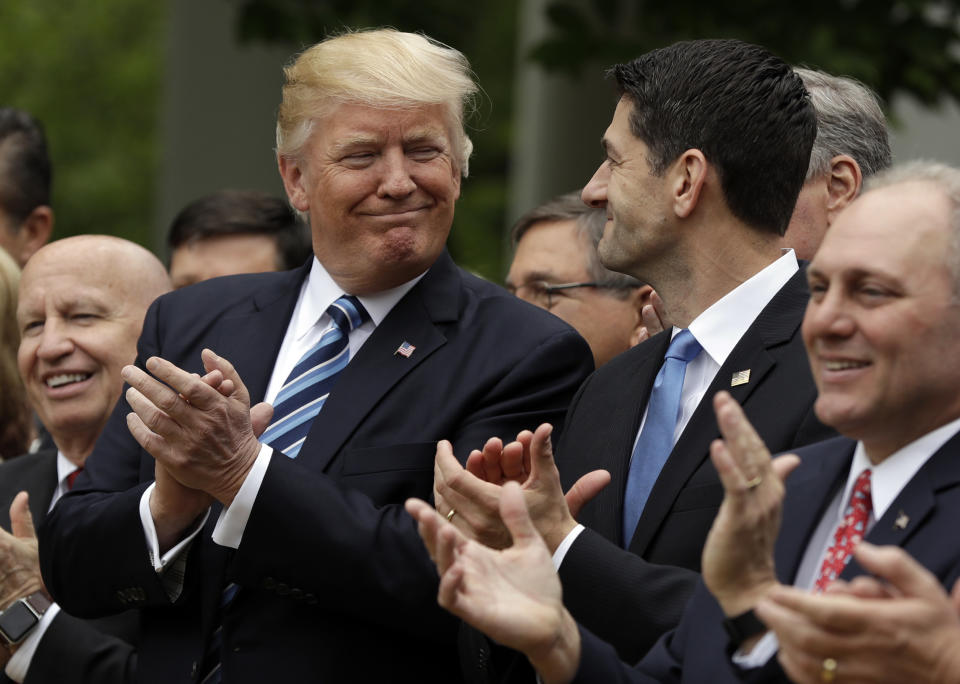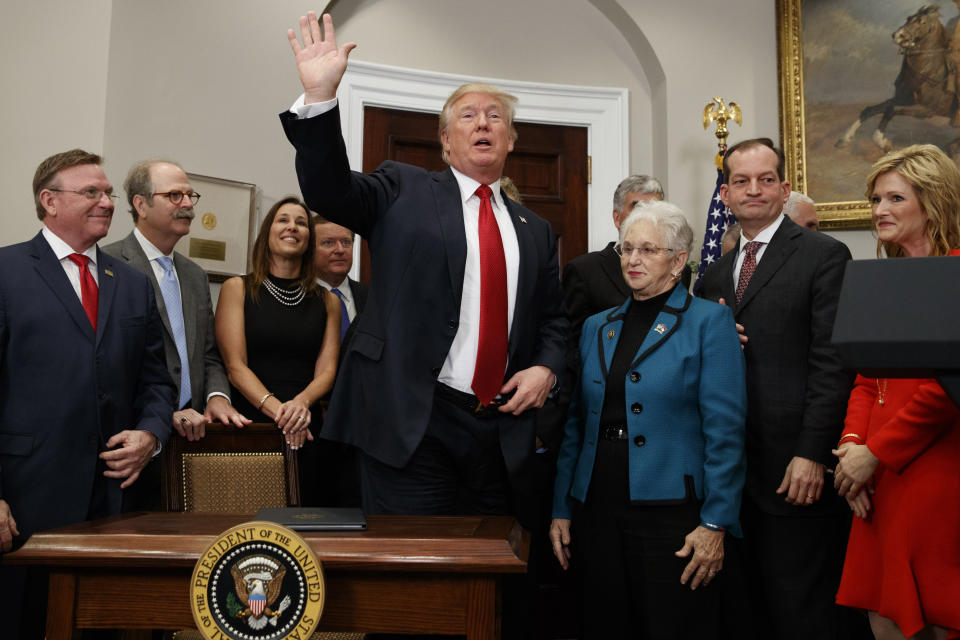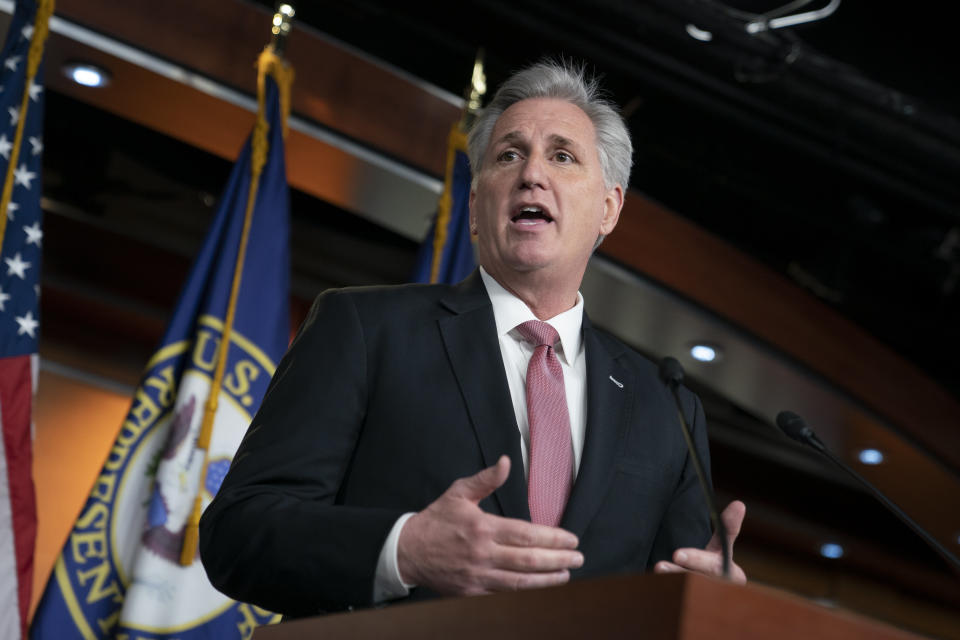Trump promises incredible health care, again
President Trump is laying the groundwork to run for reelection on reforming health care, a strategy that appears to rely on voters forgetting that he was elected in 2016 on the same promise.
Trump took to Twitter Monday evening to defend his attempt to use federal courts to fully repeal the Affordable Care Act (ACA, or Obamacare), which if it succeeds could potentially leave millions of Americans without health care. The president briefly pushed for Republicans in Congress to come up with an alternative plan, a strategy that would have been dead on arrival in the Democratic-controlled House of Representatives.
“Everybody agrees that ObamaCare doesn’t work,” wrote Trump. “Premiums & deductibles are far too high - Really bad HealthCare! Even the Dems want to replace it, but with Medicare for all, which would cause 180 million Americans to lose their beloved private health insurance. The Republicans are developing a really great HealthCare Plan with far lower premiums (cost) & deductibles than ObamaCare. In other words it will be far less expensive & much more usable than ObamaCare.”
“Vote will be taken right after the Election when Republicans hold the Senate & win back the House,” continued Trump, citing the timing. “It will be truly great HealthCare that will work for America. Also, Republicans will always support Pre-Existing Conditions. The Republican Party will be known as the Party of Great HealtCare. Meantime, the USA is doing better than ever & is respected again!”

The comments echo those made during the campaign, that Republicans would offer a great plan that covered everyone at a lower cost without any cuts to Medicare or Medicaid. Trump began making the promises in a September 2015 interview with “60 Minutes,” making vague promises when pressed by Scott Pelley on how he would fix it.
“There’s many different ways, by the way,” said Trump. “Everybody’s got to be covered. This is an un-Republican thing for me to say because a lot of times they say, ‘No, no, the lower 25 percent that can’t afford private.’ But—
“Universal health care?” interjected Pelley.
“I am going to take care of everybody. I don’t care if it costs me votes or not,” said Trump. “Everybody’s going to be taken care of much better than they’re taken care of now.”
“The uninsured person is going to be taken care of how?” asked Pelley.
“They’re going to be taken care of. I would make a deal with existing hospitals to take care of people. And, you know what, if this is probably—”
“Make a deal?” asked Pelley. “Who pays for it?”
“The government’s gonna pay for it,” promised Trump. “But we’re going to save so much money on the other side. But for the most it’s going to be a private plan and people are going to be able to go out and negotiate great plans with lots of different competition with lots of competitors with great companies and they can have their doctors, they can have plans, they can have everything.”
“We’re going to have insurance for everybody,” he reiterated in a January 2016 interview with the Washington Post. “There was a philosophy in some circles that if you can’t pay for it, you don’t get it. That’s not going to happen with us.”

Upon taking office, Trump continued to make promises of a hypothetical ideal health care plan.
“We have a plan that I think is going to be fantastic. It’s going to be released fairly soon,” Trump said after a February 2017 meeting with health insurers. “I think it’s going to be something special … I think you're going to like what you hear.”
The following day, he pointed out something that those who have worked on health care policy have known for decades: It’s extremely complicated.
“We have come up with a solution that’s really, really I think very good,” Trump said. “Now, I have to tell you, it’s an unbelievably complex subject. Nobody knew health care could be so complicated.”
Most Americans in fact knew how complicated health care was, and Trump’s judgment that the Republican solution was “really, really very good” wasn’t shared by independent auditors or the American public.
The Congressional Budget Office found in March 2017 that the American Health Care Act (AHCA), the Republicans’ proposed Obamacare replacement, would have knocked 14 million people off of insurance in one year and 24 million more by 2026, while the AARP estimated it would raise health care costs for older Americans by thousands of dollars. The Republican House passed an amended version of the AHCA in May 2017, leading to a Rose Garden celebration with Trump and House Speaker Paul Ryan, but it died in the Senate. The legislation would have slashed Medicaid for low-income Americans, despite Trump’s repeated promises to the contrary.
The July 2017 “skinny repeal” vote that barely failed in the Senate following “no” votes from Republican Sens. Susan Collins, Lisa Murkowski and John McCain was estimated by the CBO to result in 16 million more uninsured Americans by 2026 and a 20 percent rise in premiums. Researchers also found that thousands more Americans would have died prematurely if the Obamacare replacements had passed.

The proposed Obamacare replacements were also unpopular with the American public. A May 2017 Quinnipiac poll found support for the AHCA at just 21 percent. A July 2017 study by an MIT professor found that the AHCA was the least popular legislation in three decades. Over the course of 2017, Republicans found themselves under fire at district town halls over the plan. Rep. Tom MacArthur, R-N.J., who was given credit for almost singlehandedly saving the Obamacare repeal effort, lost his seat in the November 2018 midterms after winning by 21 points in 2016.
The attempts to repeal Obamacare also helped its popularity, taking it from negative-3 approval in December 2016 to plus-11 in March 2019.
Trump’s 2019 proposal — which consists of backing a lawsuit to overturn Obamacare, but not coming up with a replacement until after the 2020 election — seems unlikely to help rebrand the GOP as “the party of health care.” The legal challenge to Obamacare, which is now before the Fifth Circuit Court of Appeals, presumably will end up at the Supreme Court sometime next year. (Legal experts believe the court is unlikely to side with the administration.) Without protections for preexisting conditions provided by Obamacare, the Kaiser Family Foundation estimated in 2015 that up to 52 million people could be denied coverage. Others would lose insurance if the Medicaid expansion that was adopted by dozens of states and D.C. was killed. A full repeal with no immediate replacement plan could also hurt the fight against opioid addiction and HIV.
Last week in an interview with Sean Hannity, Trump again promised, “incredible health care that the Democrats, frankly, wouldn’t know how to do.”
Republicans insist they want to pass a plan that requires insurers to offer coverage for preexisting conditions, but analysts consider that meaningless without a mechanism to control or subsidize premiums, which was the problem the ACA sought to address with its controversial individual mandate. That mandate was repealed in the 2017 Republican tax bill.

Congressional Republicans have so far kept their distance from Trump’s plan. House Minority Leader Kevin McCarthy reportedly told the president that the decision to back the Obamacare repeal in court made no sense considering how that issue hurt Republicans in the midterms. Health care was the No. 1 issue for voters in 2018, with those who ranked it most important voting for Democrats by a margin of 75 to 23. McCarthy is not alone in his caucus.
“Not only is this a poor political move, this decision hurts real people who will unfairly lose their health insurance coverage as a result,” Rep. Tom Reed, R-N.Y., said in a statement to the Washington Post. “We need to work to find ways to fix our health care system – not blow it up.”
Democrats have seen Trump’s move back toward health care as an opportunity.
“The Republicans did say during the campaign that they weren’t there to undermine the preexisting condition benefit, and here they are, right now, saying they’re going to strip the whole Affordable Care Act as the law of the land,” said House Speaker Nancy Pelosi last week, adding, “This is actually an opportunity for us to speak to the American people with clarity.”
Read more from Yahoo News:



